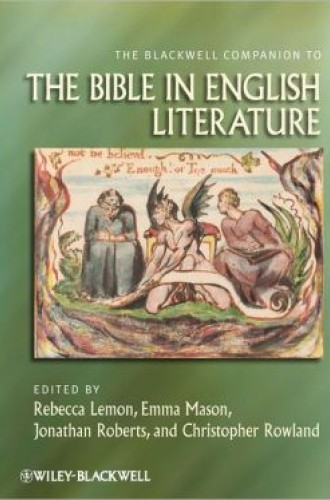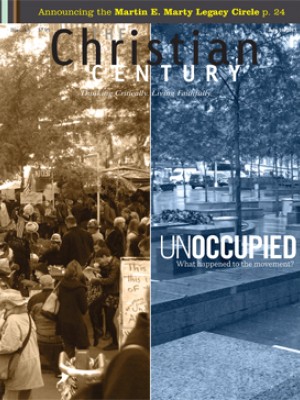The Blackwell Companion to the Bible in English Literature
Biblical material pervades the works of English literature. Bible stories have been retold, recast and reinterpreted. Biblical images have lent their resonance and biblical phrases their rhetorical power to works as various as George Herbert’s devotional poems, John Dryden’s acerbic political commentaries and T. S. Eliot’s verse dramas. Characters in English plays and novels reembody and reinvigorate biblical archetypes and prototypes and thus acquire theological depth.
Readers of every generation have wrestled with the shifting, often uneasy relationship between the sacred text and its distant, secular kin. Even where its unique status is undisputed, the Bible has been tugged and pulled at by translators who have come to blows over single words, by playwrights who have stretched the limits of poetic license, by novelists who have twisted parables into complex plotlines, and by clerics who have seasoned exegesis with imagination. The Bible has been appropriated and assimilated, translated and paraphrased, edited for children and enacted on stage. Its malleability is a fair measure of its indestructibility.
Read our latest issue or browse back issues.
Every now and again, the impulse to trace biblical stories through the thickets and deep woods of English literature results in a flurry of invitations to scholars to have a fresh go at an old conversation. Together they address questions that remain startlingly relevant. What has Paradise Lost to do with Genesis 2 and 3—and what has either to do with us? What can we learn about moral theology from a Victorian lady who lived with her lover, wrote novels, and lurked at the edges of popular academic debates? And how are we to understand T. S. Eliot’s disturbing insistence that “Love is the unfamiliar name / . . . that human power cannot remove”?
If readers are willing to peer behind its dry title, they will enjoy in The Blackwell Companion to the Bible in English Literature the fruits of those scholarly conversations. This collection of sprightly, informative, thoughtful reflections on what English writers have done to and with the Bible is an inspiration to reread the original texts, which, I believe, is still the primary aim of good critical writing.
John Drury’s chapter on Herbert, for instance, reintroduces Herbert’s much loved and much discussed poems with a touching back story: when Herbert was dying, he entrusted the poems to his friend Nicholas Ferrar, allowing him to publish the “little book” if he thought it would help people in their struggles and afflictions. Drury quotes Ferrar’s response to this legacy—“He loved that which God himself hath magnified above all things, that is, his Word”—and draws attention not only to lines where Herbert’s biblical references are explicit but also to the “wealth of covert biblical references” whose detection require a “scripturally informed eye.”
The volume presents a wide variety of perspectives from scripturally informed writers who have surveyed a broad literary landscape and know its topography well. The value of that knowledge becomes apparent in Carol V. Kaske’s essay on Edmund Spenser, which maps the effects of biblical material in literature even when it is heavily disguised or deeply imbedded in contemporary contexts. Kaske explains that writers of the Renaissance
recognized three looser degrees of fidelity to a source-text—translation, paraphrase, and the still looser types of imitation. . . . Spenser’s uses of the Bible range from a literal to an allegorical sense, whether moral or typological; from the direct to the oblique—parodic, allegorical, analogic, or otherwise far-fetched; and from the political to the purely aesthetic.
The “otherwise far-fetched” bin grew fuller over time. William Blake’s improvisational, idiosyncratic hermeneutic led him to regard the Bible primarily as a “stimulus to the imagination” and prompted him to wish “all God’s people to be prophets.” D. H. Lawrence drew his inferences about Jesus’ sexuality. And James Joyce’s “vast and multifarious” uses of the Bible emerged from a conviction that his literary mission was to realize “theological revelation as apocalypse in the modern world.”
The contributors bring fresh perspectives not only to the biblical and theological content of the works they review, but to the public debates that sent writers back to scripture with the peculiar urgencies of each one’s generation and class. Penny Bradshaw’s essay on women Romantic poets, for instance, offers an astute analysis of the historical situation of 18th- and 19th-century women of faith who plumbed patriarchal narratives for guidance relevant to their lives. Writing of Hannah More’s drama Moses in the Bulrushes, she observes:
More does not actually deviate from the biblical version but in retelling the story as a female-orientated drama and empathetically engaging with the female characters, she emphasizes the pivotal role played by the women and moves their collaboration and virtues to the center of the story’s meaning, thus developing an aspect of the narrative that is merely latent in Exodus.
As the editors point out in their gracious introduction, the essays in this collection “show the Bible and literature to be an infinitely complex topic, as the Bible changes in the hands of each author that reads it.” The authors contend that latent content informs many literary transfigurations of scriptural stories and characters and that the riches and vitality of the living word lie largely in what remains implicit, understated or even conspicuously omitted from the ancient texts. Bible reading thus always and necessarily involves the imagination. Readers who engage imaginatively owe no apology to those who plot their fidelities along the narrow way of literalism.






